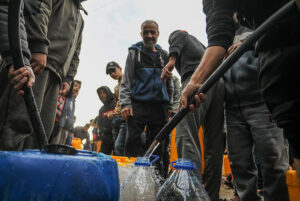In Gaza, Israel has turned water into a weapon of mass destruction

Palestinians collect drinking water in Rafah, southern Gaza Strip, 23 December 2023
Nancy Murray and Amahl Bishara report in +972 on 16 January 2024:
In November, only a month into Israel’s assault on Gaza that has now surpassed 100 days, Pedro Arrojo-Agudo, a UN Special Rapporteur on the right to safe drinking water and sanitation, warned that Israel “must stop using water as a weapon of war.” “Every hour that passes with Israel preventing the provision of safe drinking water in the Gaza Strip, in brazen breach of international law, puts Gazans at risk of dying of thirst and diseases related to the lack of safe drinking water,” he implored. The death toll resulting from the lack of water and its impact on public health, Arrojo-Agudo added, could surpass that of the Israeli bombardment itself.
Denying water to Gaza has been a key tactic of the war from the very beginning, with Israel shutting off the pipes supplying the enclave on October 7. Israeli Defense Minister Yoav Gallant announced that Israel was “imposing a complete siege on Gaza. No electricity, no food, no water, no fuel. Everything is closed. We are fighting human animals, and we are acting accordingly.”
The weaponization of water is recognized in South Africa’s accusation — heard last week by the International Court of Justice (ICJ) — that Israel’s assault on Gaza amounts to the crime of genocide. This allegation has also been made by other scholars and human rights figures including Craig Mokhiber, the former director of the New York office of the UN High Commission for Human Rights, in his resignation letter in October.
…. …. ….
A health and ecological catastrophe
Gaza’s near-total dependence on Israel for water and energy renders it particularly vulnerable to the weaponization of basic resources. About 30% of Gaza’s water supply is typically purchased from Israel, and the rest is reliant on electricity and fuel — the entry of which Israel also controls — for purification.
Since the start of the war, Israel’s tightened siege and bombardment have caused a massive shortage in the water supply. On Oct. 14, the World Health Organization (WHO) stated that the cutting off of electricity meant there was not enough power to operate water wells, desalination and purification plants, and sanitation services. It further reported that strikes had damaged six water wells, three water pumping stations, a water reservoir, and a desalination plant serving over 1.1 million people.
